"Blood group O cannot be infected with HIV virus. My wife has the virus but I am protected because of my blood group. In fact, someone just called me to donate blood for them today. We are special people. Aren't we?"
These were the exact words of the man who made me research and write this post. If you live in my country, you may be familiar with the popular motorcyclist called okada. They are common around here and offer cheap and fast means of transportation. Some of them do engage in a conversation with any customer willing to listen to them. You can call it their own way of providing value-added services. He was confident of himself as he said these words. Although the answer seems very obvious I couldn't give him a reply. I told him I would make my findings to be sure if what he said was true.
What is a blood group?
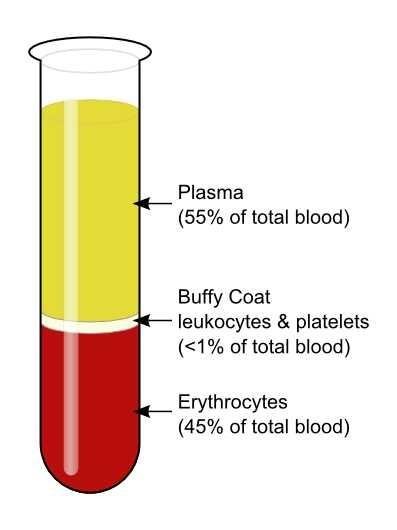 Creative Commons Attribution 3.0 Unported:Wikimedia
Creative Commons Attribution 3.0 Unported:Wikimedia
 CCO Creative Commons: pixabay
CCO Creative Commons: pixabay
The second part is the cells which will be my basis for explaining the blood types. Every living organism is is made from cells and the blood have three distinct types.
- Leukocytes also known as White Blood Cells (WBCs). WBCs are the soldiers in the body fighting tirelessly day and night to win the battle of keeping the body healthy.
- Thrombocytes also known as Platelets. Their function is that of blood clotting.
- Erythrocytes also known as the Red Blood Cells (RBCs). They are the most abundant and known for their function to transport oxygen. They do so by the presence of a protein in them called hemoglobin. Apart from this function of transporting oxygen by this cells, they are also useful in determining the blood group an individual will fall into.
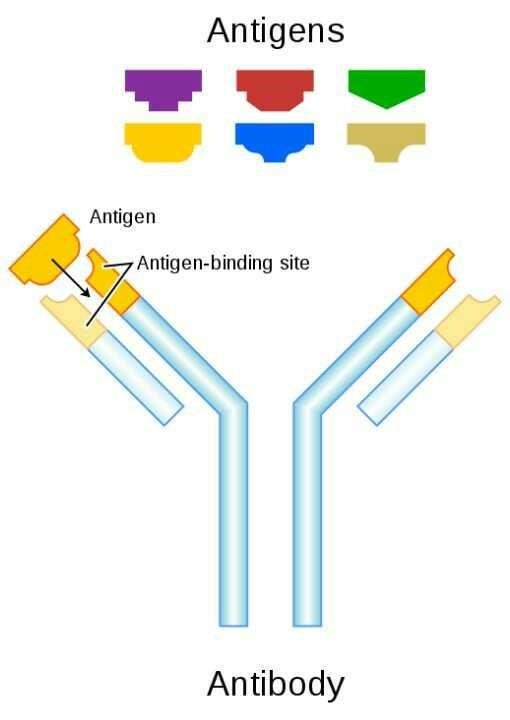 Antigen and antibody. Public domain: wikimedia
Antigen and antibody. Public domain: wikimedia
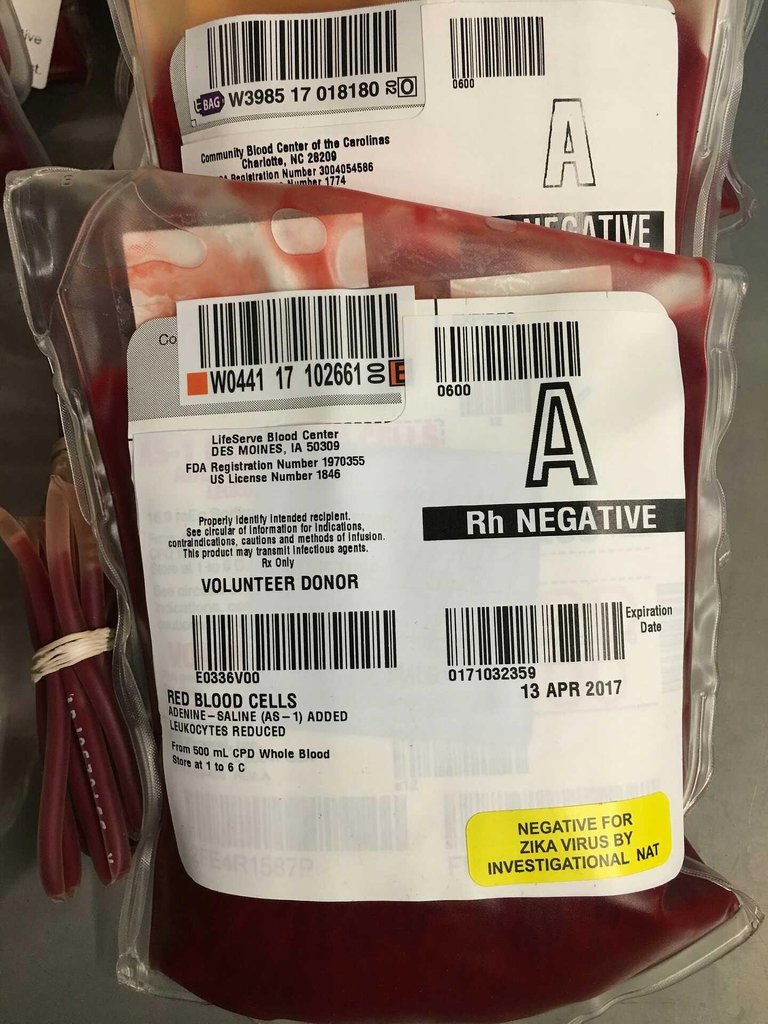 Blood samples are correctly labelled to avoid mismatch in blood transfusion. CCO Creative Commons: pixabay
Blood samples are correctly labelled to avoid mismatch in blood transfusion. CCO Creative Commons: pixabay
ABO, Rh, Kell, Duffy blood group, etc..
According to International Society of Blood Transfusion (ISBT), there are 36 blood type but the two you've probably heard of is ABO or Rh blood groups. However, it's not limited to this two.
Groups A, B, O blood group, (original called A, B, C by Landsteiner but the C was later renamed to O) is a classification of blood for the carbohydrate antigens, either A, B or both on the surface of the RBCs or antibodies A and B found in blood serum or not. The presence of antigen A means the blood is type A and the presence of Antigen B means the blood is type B. The two can be present at the same time to form another blood group AB. Various combinations of these gives four possible phenotypes which are A, B, AB and O.
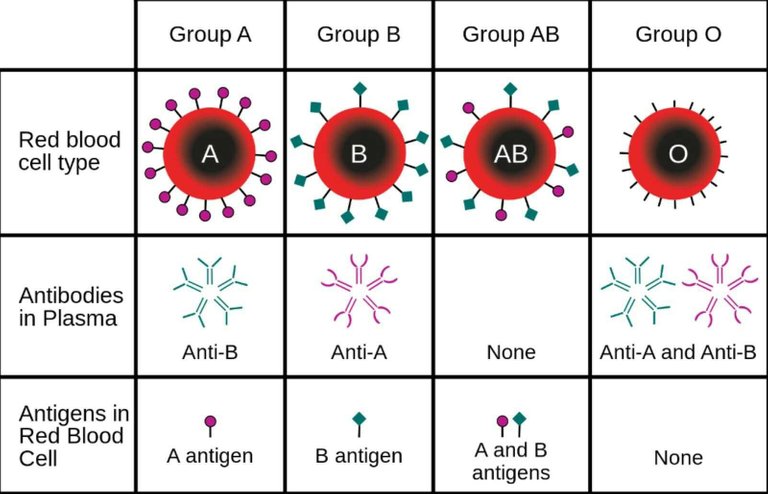
ABO blood group classification showing the various antigens & antibodies. Public domain image: wikimedia
Another important classification is the Rhesus type. It is based on types of protein antigens found on RBCs. There are 49 of these antigens but the RhD is the most significant one. People with this blood type have positive suffix added to their ABO blood group and those who don't have it have a negative suffix instead. For example, AB+, O-, etc.
Kell classification describes about 25 protein antigens. They are also clinically significant and can cause hemolytic disease of newborn. Duffy blood type is also described based on 6 protein antigens. People who lack this antigens show resistance to the parasite, Plasmodium vivax, which causes malaria.
How do you get this blood group thing?
So, you may be wondering how do you get this blood type or the other? You don't get to choose this yourself because it is left to heredity and genetics. Your parents, based on the blood type present in them, will be the one to determine the blood type that you will have. I'll love to keep this simple so I will use the ABO blood type to explain how they are inherited. In genetics, there is dominant gene action and the recessive gene action. The former is when a gene is expressed strongly at the expense of the latter which, although present in an organism, is not pronounced as the dominant. But there is a third situation where genes in an allele are inherited codominantly. That is, one is not expressed greatly than the other and hence, they both coexist to give a new phenotype as in the case of type AB. Both antigens A and B can be inherited co-dominantly over O.
It's important to note that genes carries information to produce the phenotype which are observable traits found in an organism. There are 4 phenotypes expresses in the ABO classification and they are phenotype A (genetically AA or AO), phenotype B (genetically BB or BO), phenotype AB (genetically AB ) and the phenotype O (genetically OO). For this post, we won't be needing more than this.
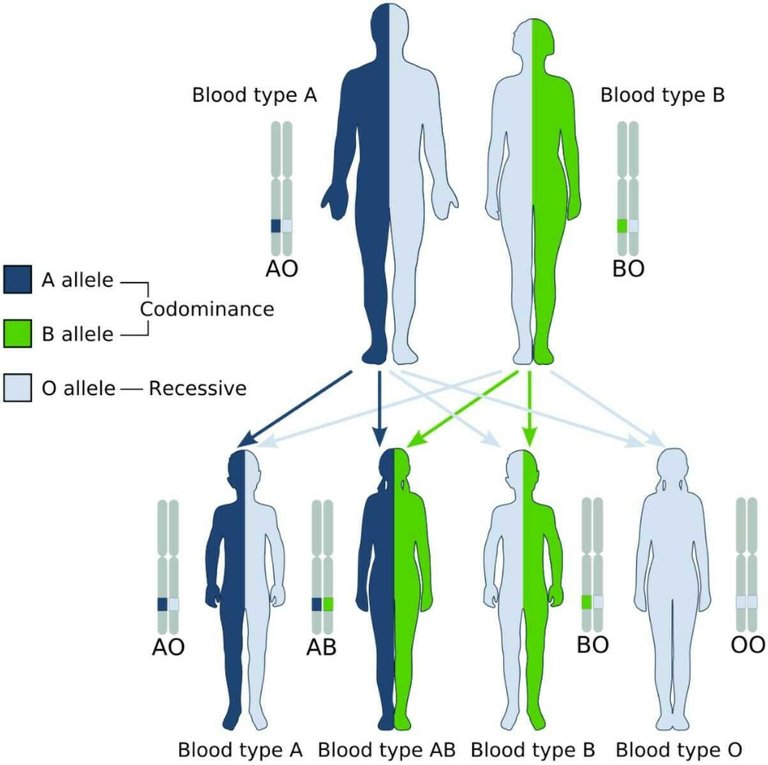
Public domain picture: Wikimedia
Significance of blood group to disease resistance
I'm sure you may be interested to read this part of this post than the rest part. You want to be sure if your blood type helps you or work against you when it comes to certain infections. Well, scientists have a common interest in the same topic right from the time they discovered the blood groups.
As far back as 1953, it has been observed that there is a relationship between stomach cancer and the ABO blood types. Type A is more likely to have to stomach cancer and blood type O least susceptible [1]. However, another study in 2010 found out that there is a reduced risk of about 14% among people with blood types A, B, and AB as compared to those with blood group O for skin cancer [2]. A cohort study of the relationship between incident of cognitive impairment and the ABO blood and Factor VIII found the type AB to have a higher risk of cognitive impairment [3]. Cognitive impairment include such problems that deals with memory and thinking patterns. Cognitive impairments and CVDs are known to have similar risk factors. Report from two prospective cohort study showed that ABO blood type had relationship with the risk of coronary heart disease but the risk is lower in type O [4].
Another one I did not mention is the Lewis blood group. It is classified by carbohydrate antigens represented by Lea and Leb. The phenotypes that can be expressed based on this are Le(a+b-) or Le(a-b+) or Le(a-b-). The presence of an antigen is represented by the + sign and the absence is represented by the - sign. The Le(a-b+) phenotype have a reduced risk of infection by Vibrio cholerae while the Le(a+b-) phenotype has more risk[5]
Lastly, I will like to talk about malaria. It is one of the leading cause of death, especially in developing countries. Malaria is caused by Plasmodium when one is bitten by an infected mosquito, especially female Anopheles mosquitoes. There are 4 species of Plasmodium known to cause this disease in human but Plasmodium falciparum causes most of it followed by Plasmodium vivax. Duffy blood type is another type. In Duffy, 6 protein antigens are recognized. People with this this antigen are at more risk of being infected with malaria caused by Plasmodium vivax [6]. The severity of P. falciparum malaria is directly correlated with whether it is blood group A and B; people with type O tend to be less severely affected by malaria, while A and B blood group individuals are at greater risk of malarial anemia
The man who claimed he can't be infected with HIV because he is blood group O is wrong because all through my findings, I did not come across any protective effect of blood groups against HIV. The man may be wrong with that but your blood group may give you some level of immunity against certain diseases and infections.
References:
- 1. Ian Aird et al. (1953). Relationship Between Cancer of Stomach and the ABO Blood Groups. Available as pdf
- 2. Jing Xie, et al. (2010). ABO Blood Group and Incidence of Skin Cancer. Available online
- 3. Kristine S. Alexander et al. (2014). ABO blood type, factor VIII, and incident cognitive impairment in the REGARDS cohort. Available online
- 4. Meian He et al. (2012). ABO Blood Group and Risk of Coronary Heart Disease in Two Prospective Cohort Studies. Available online
- 5. Mohammad Arifuzzaman et al. (2011). Individuals with Le(a+b−) Blood Group Have Increased Susceptibility to Symptomatic Vibrio cholerae O1 Infection Available online.
- 6. Laura Dean (2005). Blood Groups and Red Cell Antigens. Available online at NCBI p. 86.
- 7. D Rose Ewald and Susan CJ Sumner (2017). Blood Type Biochemistry and Human Disease. Available online
- 8. Human blood group systems
Badly formatted and difficult to read. You might want to edit..
Thanks for the observation. I messed up with some tags which I have corrected now.
Posted using Partiko Android
I upvoted your post.
Keep steeming for a better tomorrow.
@Acknowledgement - God Bless
Posted using https://Steeming.com condenser site.
Putting the formatting error aside, no one is immune to any form of diseases. We are, in a way, prone to get one more than the other but to say that we are entirely protected from something is genuinely irresponsible and arrogant. They might be the one who spread diseases more than the other due to ignorance.
Well composed information. Kudos. If some people said they have HIV but would not progresses to AIDS, then that might be true because according to research, there is a defective strain of HIV which causes no symptoms and does not affect the immune system.
Thanks doctor for your input to this. I'm sure the man ignorantly believed what he heard from someone else. Anyways, I adviced him to get himself checked to be sure if he had the virus or not.
Posted using Partiko Android
Hello! I find your post valuable for the wafrica community! Thanks for the great post! We encourage and support quality contents and projects from the West African region.
Do you have a suggestion, concern or want to appear as a guest author on WAfrica, join our discord server and discuss with a member of our curation team.
Don't forget to join us every Sunday by 20:30GMT for our Sunday WAFRO party on our discord channel. Thank you.
Congratulations @mr-aaron! You have completed the following achievement on the Steem blockchain and have been rewarded with new badge(s) :
Click on the badge to view your Board of Honor.
If you no longer want to receive notifications, reply to this comment with the word
STOPDo not miss the last post from @steemitboard:
This post has been voted on by the SteemSTEM curation team and voting trail in collaboration with @curie.
If you appreciate the work we are doing then consider voting both projects for witness by selecting stem.witness and curie!
For additional information please join us on the SteemSTEM discord and to get to know the rest of the community!